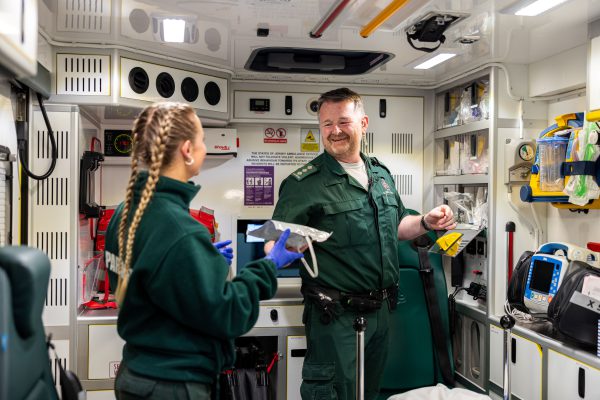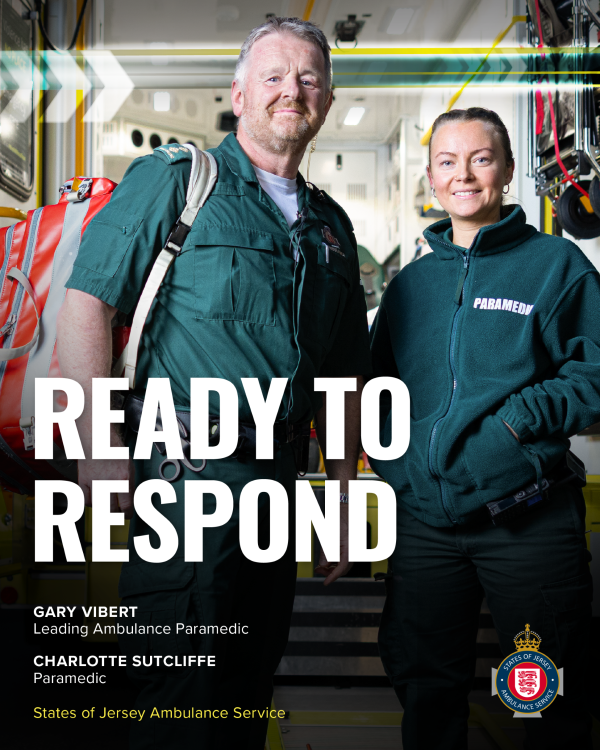
Inspired by his colleagues and the lives they touch
As a Leading Ambulance Paramedic, Gary Vibert has administrative and line-manager responsibility for paramedics, ambulance technicians and emergency care assistants but maintains a front-line role by attending serious incidents.
His route to the career with the States of Jersey Ambulance Service came via a mid-life career-change after the family business he had worked in since leaving school was sold 17 years later.
He had always been the trained first-aider in the family business and enjoyed the role. He was also inspired to apply by a friend who was a paramedic.
He joined as a trainee ambulance technician in 2008 and then became a qualified technician. The next step was attending a Paramedic course in the UK.
“This was the first course that involved university elements and academic writing, which was tough as a mature student with hundreds of hours of study and exams and tests to pass. Without doubt receiving my epaulettes to become a fully qualified Paramedic was a massive relief with a huge sense of pride and achievement,” Gary explained.
Once qualified, the sense of responsibility that comes with the role became a reality: “Learning to be a decision-maker in sometimes life-and-death situations is a steep learning curve and can weigh heavily sometimes.”
His next step was to move to the post of Leading Ambulance Paramedic (LAP), a role he loves as it is a managerial position but still allows for time out on the road treating the more serious patients.
A typical day shift for Gary starts around 06.30 with a check on the night crews. He then makes the daily check on the fast response car, while day staff carry out their morning checks. Afterwards all of the staff gather for a morning meeting. The rest of the shift varies from day to day and the night shifts follow a similar pattern.
“We are a constantly rolling road, a service that never stops and runs 24/7 which means as a manager it is important to stay focussed and keep in line with constant changes and updates. Being trained to deal with and manage major incidents is one of the most important parts of my role. Command and control is vital and good communication is essential, and it is my role to ensure that incidents run smoothly to enable the best possible outcome for all,” Gary explained.
Every day is a learning day to Gary and his colleagues as Continuing Professional Development is an important part of the job. He explained: “It keeps you fresh and up to date, and basically you always have to be at the top of your game.
“Paramedic care is ever-evolving throughout the UK and as we grow as a service, I would like to see the SoJAS at the forefront of new medicines, pre-hospital treatment and new equipment. Being based in an island, we are the perfect service to push forward and try new methods.”

“Without doubt it is bringing someone back to life. To resuscitate somebody and see life just return to their body is an amazing experience and it gives you massive confidence in what you do.“
Asked what parts of the job are most rewarding, his response is unsurprising but thought-provoking: “Without doubt it is bringing someone back to life. To resuscitate somebody and see life just return to their body is an amazing experience and it gives you massive confidence in what you do.
“Also seeing a new baby arrive into the world is just incredible, even though it can be one of the hardest things you will ever have to do as a clinician. It is still such a poignant moment, and you just never forget it.”
He also recalled an act of compassion for which he later received an award after taking a diversion while transporting an end-of-life patient to Jersey Hospice.
He explained: “It was the patient’s wish to take one last look at the sea and we drove them and their daughter to a layby and opened the back of the ambulance so they could share that experience together.
“It was such an emotional moment and sometimes you simply just have to do the right thing. Not all triumphs are life and death emergencies, care and compassion are some of the strongest attributes that we all have at the ambulance service.”
When asked what other skills and attributes are useful for those considering a career as a paramedic, Gary said it helped to be a glass-half-full type of person and be able to remain calm in stressful situations.
“In my own case, having previously run a business has helped greatly with people management and I was always taught to have a good work ethic. Being able to laugh, smile and joke is something very important and I am lucky enough to work with likeminded people,” he said.
Gary is involved at all command levels having qualified as a National Inter-agency Liaison Officer in 2017. He described how over the years he has seen the blue-light services and associated Health departments coordinate ever more closely. “Good communication is vital and I think Jersey can be proud of how well we all work together collaboratively and effectively to make sure we live in the safest environment possible.”
He recalled an example of joint-service working with a time-critical patient with life-threatening injuries who was on the water line as the tide was rising rapidly.
“We worked to treat, immobilise and secure the patient and together with the Fire and Rescue Service we extracted the patient as the sea was lapping around our ankles. Working as one big team we managed to get the patient back into a warm ambulance where we could stabilise and then transport them to the Emergency Department,” he explained.
A happily married father of four children and five cats, he derives great satisfaction knowing that his family are proud of what he does.
Working on the frontline obviously brings its stresses and looking after your personal wellbeing is an important consideration.
“It is a hard balance sometimes. It can be really difficult,” Gary admitted. “Shift work is hard and there is a heavy workload. We have systems in place to help with wellbeing at work, but inevitably we all have the odd job that hits hard and can be really tough to deal with. Luckily, we are one big family and we can rely on the support and help from our colleagues around us no matter what.”
He draws motivation from those colleagues and the people whose lives they touch every day to fuel his passion for the job.
“I am so lucky to work with such an amazing team of dedicated people. We can all laugh and cry together. We support each other in and out of work. We definitely are an eclectic mix and it takes a special type of person to do this job for sure.”
If you think you have what it takes to join the team at SoJAS ……
Find out more about available roles at Ambulance Service
 blog.gov.je
blog.gov.je